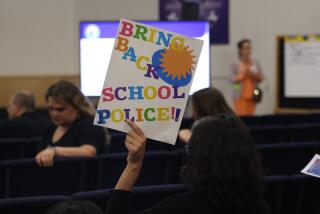Supreme Court says age matters in police questioning
- Share via
Reporting from Washington — The Supreme Court bolstered the rights of juveniles for the second year in a row, deciding by a 5-4 vote that police officers who remove a student from class for questioning about a crime usually must warn him or her of the right to remain silent.
The decision Thursday did not set a strict rule for all cases involving police questioning of minors, but the justices said young people deserved extra protection because they would feel they had no choice but to answer.
“It is beyond dispute that children will often feel bound to submit to police questioning when an adult in the same circumstance would feel free to leave,” wrote Justice Sonia Sotomayor. “Seeing no reason for police officers or courts to blind themselves to that common-sense reality, we hold that a child’s age properly informs the Miranda custody analysis.”
The decision reopens the case of a 13-year-old student from Chapel Hill, N.C., who was taken from his seventh-grade class by a police officer and questioned about several burglaries in his neighborhood. The student, identified only as J.D.B., eventually confessed.
He later contended his confession should not have been used because he was not warned of his rights. But he lost in a 4-3 decision by the North Carolina Supreme Court, which said the age of the suspect did not matter.
The famous 1966 Miranda decision that required warning suspects about their rights applies only to people who are in the custody of police and would feel forced to answer questions. At issue in the case was whether a 13-year-old at school would think he was required to speak to police, or instead would understand that he was “free to leave” and could walk away from the interview.
Sotomayor said age is a crucial factor, and suggests the student would feel he is in the control of the police. “The custody analysis would be nonsensical absent some consideration of the suspect’s age,” she said. If a suspect is seen to be in police custody, officers must warn him or her of the right to refuse to answer questions and of the option to consult a lawyer.
The Juvenile Law Center in Philadelphia called the ruling a “landmark decision [to] protect Miranda rights for youth.” It “further demonstrates the Supreme Court’s recognition that ‘kids are different’ under the Constitution,” the group said.
Last year, the high court outlawed the imposing of a life term in prison without parole for juveniles who commit crimes short of murder.
The decision in J.D.B. vs. North Carolina sends the case back for judges to reconsider whether the student was in police control when he was questioned. Joining Sotomayor in the majority were Justices Anthony M. Kennedy, Ruth Bader Ginsburg, Stephen G. Breyer and Elena Kagan.
The four dissenters said the focus on the age of the individual would be confusing for police and judges.
More to Read
Sign up for Essential California
The most important California stories and recommendations in your inbox every morning.
You may occasionally receive promotional content from the Los Angeles Times.














